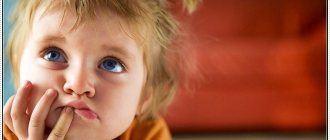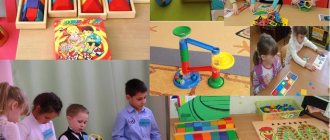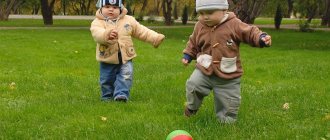Most preschool children can be said to be very active, and in some cases even hyperactive. Kids are easily distracted, quickly lose interest in anything, they are emotional and never sit still. And this is absolutely normal, because perseverance and the ability to self-control at this age are just beginning to form. However, if a child experiences serious and systematic difficulties in controlling his behavior and emotions, this will negatively affect his interactions with adults and peers, as well as the learning process. In this case, most likely, we are talking about hyperactivity as a serious problem that needs to be solved together with specialists (doctors, psychologists, teachers). What is the difference between activity and hyperactivity? What is ADHD? How to deal with a hyperactive child? How can parents help their baby? We will talk about this with you today.
What is the difference between activity and hyperactivity?
A healthy preschool child is an active child. He loves to run, jump, play outdoor games, sing and dance, asks a lot of questions about everything in the world, throws toys around, and so on. How to distinguish a high level of activity from hyperactivity and overexcitability? An active child does not behave this way always and not everywhere. If the baby is interested in something (for example, a book or a game), he can calmly go about his business. In the presence of unfamiliar people or in a new environment, the child is usually not as restless as at home. Excessive activity can also be a consequence of stress, fatigue or boredom, as well as a desire to attract attention, so when the stimulus disappears, the level of activity soon returns to normal.
A hyperactive child, on the contrary, behaves equally actively in all situations: at home, in kindergarten, at a party, and even at a doctor’s appointment. Moreover, obsessive mobility does not have any purpose. Persuasion, requests, punishments and other educational measures do not work on a hyperactive child, since a hyperactive child simply cannot control his behavior.
Hyperactivity is often considered solely as a characteristic of a child’s behavior, but one must understand that external manifestations are a consequence of overexcitation of the baby’s nervous system. Only a doctor can diagnose ADHD.
Causes of hyperactivity in children
The formation of ADHD and the child’s hyperactivity itself can be influenced by a very large number of factors. Official medicine identifies the following causes of ADHD in children:
- Hereditary factors;
- Organic lesions of the fetal central nervous system during pregnancy;
- Pathological conditions and bad habits of the mother during pregnancy;
- Birth trauma suffered by the child;
- Early traumatic brain injuries in a child received in the first months of life;
- Infections;
- Poisoning;
- Unfavorable environmental conditions and poor nutrition.
The changes that occur in the nervous system of children with ADHD are associated with the production of dopamine and thinning of the cerebral cortex. They are insignificant, but their consequences are irreversible, because this syndrome cannot be treated with any medications and remains with the person for life.
Attention Deficit Hyperactivity Disorder (ADHD)
Attention deficit hyperactivity disorder in children of senior preschool and primary school age is usually considered as a combination of three components: inattention, impulsivity and hyperactivity. A diagnosis can be made if these signs are observed in a child for at least 6 months in a row and interfere with adaptation among peers. Let's look at each of them in more detail.
Inattention:
- The baby cannot maintain attention on small details, so he often makes mistakes when performing various tasks;
- Due to the fact that the child does not concentrate well, he does not always respond to speech addressed to him (including comments);
- Extraneous irritants easily distract the baby even from an interesting activity;
- It is difficult for him to finish what he has started. Sometimes adults get the impression that the child is rebelling because he doesn’t like something, however, the reason is that the child finds it difficult to follow instructions and rules;
- Children often avoid tasks that require long-term concentration;
- Difficulties in planning and organizing your own activities (studies, games, communication, and so on);
- Forgetfulness. Inattentive children often lose their things and forget to do something.
Most often, hyperactivity is combined with attention deficit disorder (ADHD), but there are cases when hyperactive children retain perseverance and the ability to concentrate when performing various tasks.
Hyperactivity:
- The baby is constantly on the move;
- The child does not sit still; while performing a task, he can get up for no reason and do something else;
- Hyperactive children are characterized by fussiness, fidgeting in the chair, obsessive movements of the hands and feet;
- Motor activity (the child is constantly running, trying to climb somewhere, spinning in place) has no purpose;
- Quiet and calm games are not held in high esteem by hyperactive children. They almost never rest and have difficulty sleeping;
- They talk a lot and interrupt other people, constantly asking questions about everything and nothing.
Impulsiveness:
- The child does not listen to the end and gets ahead of himself;
- Waiting is very difficult for him;
- The baby has a hard time learning the rules of communication, interferes in conversations, games, and interferes with other children and adults.
From the first years of life, a hyperactive child can often notice such manifestations as increased muscle tone, spasms when eating, nervous tics, sleep problems, high sensitivity to sounds, light, heat and other external stimuli, an increased pain threshold (insensitivity to pain). ), clumsiness.
Manifestations of hyperactivity, impulsiveness and inattention become most noticeable upon entering kindergarten. During the school years, problems only increase, but by the end of adolescence they usually disappear.
When a child ends up in a kindergarten or school, numerous demands are immediately placed on him: follow the rules and routine of the day, listen to the teacher or educator, sit quietly and answer only when asked. The nervous system of a hyperactive baby has difficulty coping with increased physical and psychological stress. Due to a lack of self-control, he is constantly distracted, does not perceive information well by ear, and as a result, problems with reading, writing and mathematics may arise.
Specifics of raising a hyperactive child
Hyperactive special children see the world differently, react to it differently than everyone else, and solve problems and difficulties that arise differently. These differences require a specific approach to teaching and raising hyperactive children.
What to do if your child is absent-minded?
The almost inability of a hyperactive child to concentrate leads to unstable interest in activities and a lack of concentration on any one subject. A child’s constant absent-mindedness requires compliance with the psychological law of three times “N”: short but frequent instructions, rewards, reminders.
Some tips for dealing with absent-minded children:
- Always try to make eye contact when talking to your child.
- Use short phrases when addressing your baby; as a rule, auditory memory suffers in children with hyperactivity. Ask your child to repeat what you say, rather than limiting yourself to monosyllabic answers.
- Say clearly, clearly, directly and once: “Stop jumping/running/shouting.” Use not abstract phrases like “clean up the room,” but specific ones: “put the books back in their place,” “put the toys in the drawer.” Tasks must be clear and consistent.
- Set tasks one by one and gradually, checking the completion of the previous one. The child may not remember all the tasks given at the same time: “Go to the room, wash your face, change your T-shirt, do your homework...”.
- Try breaking down your homework into small tasks. You can start doing the work together, and then step away and occasionally approach with an offer of help or advice.
- Talk to your offspring personally. Don’t shout from the kitchen “Go to lunch!” if your child is playing something. Join the game, and at the first convenient moment, call him to the table. Hyperactivity does not mean stubbornness or stupidity, it just makes it difficult for a child to quickly move from his actions to yours.
- To attract the child’s attention and concentration, you can use a non-standard approach: games, stories, humorous techniques, interesting gestures, facial expressions, touches.
- A child needs order, especially a hyperactive one, so eliminate clutter forever where you live.
- Try to keep your offspring in sight and hearing. Hyperactive children find it very easy to find distracting objects, so they need constant help to concentrate on a specific task.
- Praise and thank children for completed tasks. Whether it is verbal praise or material reward is up to you to decide.
How to raise an impulsive child?
The behavior of hyperactive children depends on impulse; they cannot predict the consequences, so be prepared for the fact that the child may have accidents.
Tips for dealing with impulsivity:
- Teach your child to count in his head, for example, to ten, and only then do anything. Try to explain to your offspring that there are actions and their consequences, and this should always be taken into account. Foster in your child the ability to imagine himself in another person’s place. Consolidate the acquired skills in practice.
- Give your offspring the opportunity to make a choice. Making a decision forces him to stop and not act impulsively. The question could be, for example: “What tasks would you do first: in mathematics or the Russian language?”
- Entrust your child with caring for a pet to develop empathy, gentleness, sensitivity, and the ability to look after a living creature.
- Remember that the same teacher cannot be next to an impulsive child - this is absolutely unacceptable. Work on yourself, first of all, be wiser in any situation. Your child has no one else to rely on but you.
- Think in advance about how to keep your child occupied during forced waiting, for example, in a queue. These could be mental or verbal games, a book, or your interesting story.
How to constructively use a child's excess energy?
The aimless movements, restlessness, and constant bustle of children with hyperactivity force their parents to constantly and tirelessly look after them. The main parental task is to use the child’s excess energy in a constructive way.
Recommendations for dealing with hypermotility in a hyperactive offspring:
- You should teach your child to relax completely, for example through calm music, breathing exercises or meditation.
- Your offspring must respect the personal space of the people around him.
- Arrange your home so that your child feels comfortable in it. Please note that the house is unlikely to ever be in perfect order; do not expect too much from a hyperactive child.
- Cultivate in your child the ability to listen carefully and not interrupt.
- Keep your parenting methods stable and systematic. Connivance can destroy the results of a concept that has been implemented for years.
Recommendations for parents
If your child has persistent signs of hyperactivity, you should definitely consult a neurologist and psychologist. Specialists will diagnose the physical and mental development of the baby, based on the results of which they will draw up an individual treatment plan and behavior correction. The environment in which an active and hyperactive child usually finds itself greatly influences his behavior, so it is important for parents to adhere to the following principles:
- Create a calm environment at home;
- Do not punish or scold your child for “bad” behavior;
- Follow a daily routine;
- Nutrition should be balanced;
- Give your child the opportunity to splash out accumulated energy (sports, active games while walking);
- Limit your child from watching TV and using gadgets;
- Spend more time outdoors;
- Avoid noisy places and large crowds of people;
- Introduce quiet games and creative activities;
- Give your child specific requests and instructions;
- Teach your child self-organization skills. To do this, you can use various visual materials or reminders (for example, schematic images of actions that a child should perform before bed: brush teeth, wash, put on pajamas, go to bed).
Hyperactive children often face negative attitudes from people who do not understand the functioning of the nervous system and child psychology. That is why such children need special support and acceptance from loved ones.
A hyperactive schoolboy or how to raise a fidget
It is in elementary school that the problem of child hyperactivity is most often discovered. Before this, relatively calm children become too impulsive, talkative and restless, concentration is lost, problems with sleep, speech, and even convulsive twitching of certain parts of the body may arise, as well as problems in communicating with other children.
How to help a small schoolchild if concentrating on the subject of study or simply sitting in class is already a big problem for him. Psychologists recommend that parents and teachers of such students act in stages in accordance with the points described below.
Step one: understand the features.
That is, parents and teachers must coordinate their actions with the attending physician, psychologist and neurologist. IN
in accordance with medical recommendations, establish the workload and psychological climate in the team for a given student. Be sure to psychologically prepare your child for school in advance.
Step Two: Set the Rules
As has already been said, a strict routine and rules are needed in accordance with which the child’s interaction in the school team is built.
Step Three: Manage Energy Reset
Adults must learn to manage the release of energy in children using various techniques so that its release does not become an uncontrollable catastrophe. Plan your children's leisure time, keep your child busy with his favorite activities: dancing, drawing, swimming, a walk in the park, etc.
Step four: remove irritants
Patients with ADHD cannot concentrate their attention for long periods of time, so it is very important that they are not distracted by anything from the subject of study.
Games with hyperactive children
- Games for developing attention
- "Catch - don't catch." The most famous game in this category is “Edible - Inedible”. The presenter throws the ball to the child and says the word. If this word means an edible object, the baby must catch the ball, and if it is inedible, then return it. By analogy with this, you can come up with many different games that will be interesting specifically for your child (for example, “Transport is not transport”, “Living - inanimate”, “Dangerous - not dangerous” and so on).
- "Pathfinders". Choose a small toy and hide it in the room, but so that it can be seen. To find the right item, the baby needs to be attentive and not be distracted by other things.
- “Ears on the Top of the Head” is a game aimed at developing auditory attention. Its essence is to hear which of the named words have a certain sound. For example, agree that you will say words, and the child should clap his hands every time he hears the sound “r”.
- Games to develop self-control
- “Freeze.” Turn on dynamic, fun music and invite your baby to dance. As soon as you press pause, the child should freeze in place.
- "Wait for the signal." This is a word conversation game. Its essence lies in the fact that the adult asks the baby various questions, and the child can begin to answer them only after a certain signal (for example, when you touch your ear with your hand or fold your arms over your chest).
- “I’m silent - I whisper - I scream.” The child’s task in this game is to perform all actions, focusing on the sign that the adult shows him. Agree with the baby on the conventions: for example, a sleep gesture - the baby should be silent and not move, a finger at the lips - speak quietly and move slowly, hands up - you can scream, run and jump.
- Games to relieve emotional and muscle tension
- “We draw with our fingers.” Ask your child to take a relaxed position and close their eyes. On his back or palm you can “draw” various figures, numbers, letters and other schematic images with your finger. The child must guess what you drew.
- "The wind is a breeze." Together with your baby, draw a strong wind and a weak breeze with your hands. This can be done to classical music, depending on its tempo.
- "Soap bubble". In this game, the adult pretends to be blowing a soap bubble, and the child “flies” around the room like a bubble. After the command “burst”, the baby must lie on the floor.
Should I go to the doctor?
If your child is hyperactive, you should consult a pediatric neurologist. If a behavioral deviation is not corrected, then its signs can then continue into adulthood, negatively affecting career development and family relationships.
The pediatric neurologist prescribes the following medications:
- vitamin complex;
- nootropics;
- herbal remedies.
Treatment with medications will help eliminate concomitant unpleasant symptoms in the child associated with a physiological change in condition.
conclusions
Many children of preschool and primary school age look too active in the eyes of adults. They are constantly on the move, love active games, and cannot sit still. And this is normal, because an active baby is a healthy child. But some children do not become calmer even in an unfamiliar environment; their activity is intrusive, it prevents them from learning information and adapting to a peer group. The nervous system of hyperactive children is too excitable and has difficulty coping with a large number of stimuli, resulting in inattention, impulsiveness, and an inability to control behavior. To help a hyperactive child cope with difficulties, you need to develop a special educational approach to the child, accept him as he is, and not scold him for “bad” behavior. A favorable home environment, daily routine, sports, special games and other important things are what parents can use for the benefit of their baby.
What should you not do when raising hyperactive children?
There are several “golden” rules that tell parents what to avoid and what absolutely cannot be done when raising hyperactive children:
- Don't use the word "no" when talking to your child. Try to construct phrases so that they do not contain prohibitions through negation. For example, instead of saying “don’t walk on the lawn,” say “walk on the path.”
- Don't read long notes. Keep the prohibition short and clear.
- Don't punish. Punishments only anger a hyperactive child; he is not able to understand why he was punished.
- Do not use the word “bad” when speaking about your offspring’s behavior. Instead of “don’t do this,” use “we will do the right thing together.”
- Forget about negativity and scandals. This applies to the attitude towards the child, towards oneself and towards the situation.
- Do not send your child to sections or clubs so that his energy can be directed in the right direction. Children with hyperactivity cannot tolerate repetition of any kind. Create an “energy release” schedule for your child at home if it is not possible to hire an individual trainer.
- Do not forget about the safety of a hyperactive child, because for him getting abrasions, cuts or bruises is a trifle.
- Don't try to correct mistakes while working diligently on a task, as this may ruin your child's enthusiasm.
- Avoid overtiring your child (TV, computer, shops, markets, etc.).
- Do not make excessive demands on your child.
- Do not force your offspring to eat.
- Don't forget to tell your baby how much you love him.
Raising a hyperactive child is extremely difficult; at times you may feel that it is he who controls you, and not you who controls him. But always remember: special children are not worse than everyone else, they are just different. Develop yourself, comprehend non-standard methods of education and one day you will understand that not only you make your offspring better, but he also makes you better.
What to do when you are hysterical?
If a hyperactive child has a tantrum and he stops hearing those around him, parents can simply go to another room. Then the baby, having lost his existing audience, will gradually calm down.
You can try to switch your child's attention to an interesting cartoon or a new toy. It’s a good idea to invite him to play an active game, for example, tag. It is also useful for your baby to make soothing tea or warm sweet water.
In order to subsequently avoid the hysterical state of your own child, you need to strengthen his nervous system. To do this, it is useful to take baths with the addition of valerian herb.
How to deal with a child with ADHD?
In addition to drug therapy, the doctor will prescribe behavior correction for the baby’s parents. This:
- avoiding too high demands on the child;
- adherence to daily routine;
- frequent praise of the baby;
- teaching the child proper relationships with peers;
- introducing the child to social norms in a playful way.
Parents should try to create situations for their child in which he can show his strongest sides. To do this, it is better to use various games in which physical activity is combined with moments of a calm state.
Swimming, modeling, and dancing help correct the behavior of a hyperactive child. But you also cannot do without drug treatment.










